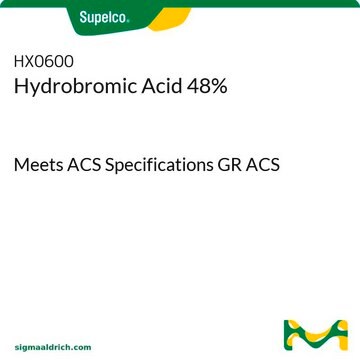339245
Hydrobromic acid
48 wt. % in H2O, ≥99.99%
Iniciar sesiónpara Ver la Fijación de precios por contrato y de la organización
About This Item
Fórmula empírica (notación de Hill):
HBr
Número de CAS:
Peso molecular:
80.91
Beilstein/REAXYS Number:
3587158
MDL number:
UNSPSC Code:
12352106
PubChem Substance ID:
NACRES:
NA.21
Productos recomendados
vapor density
2.8 (vs air)
Quality Level
vapor pressure
320 psi ( 21.1 °C)
8 mmHg ( 25 °C)
description
48% aqueous HBr
assay
≥99.99%
form
liquid
concentration
48 wt. % in H2O
density
1.49 g/mL at 25 °C (lit.)
SMILES string
Br
InChI
1S/BrH/h1H
InChI key
CPELXLSAUQHCOX-UHFFFAOYSA-N
¿Está buscando productos similares? Visita Guía de comparación de productos
Categorías relacionadas
General description
Hydrobromic acid is a strong acid that can be used as a brominating reagent for the electrophilic and radical bromination of olefins, alkynes, and ketones.
Application
Hydrobromic acid can be used as a brominating agent for the:
- Bromination of benzothiadiazoles and methylamines.
- Oxidative bromination of olefins, alkynes, and ketones to corresponding dibrominated alkanes, alkenes, and α-bromoketones.
signalword
Danger
hcodes
Hazard Classifications
Eye Dam. 1 - Met. Corr. 1 - Skin Corr. 1B - STOT SE 3
target_organs
Respiratory system
Storage Class
8B - Non-combustible corrosive hazardous materials
wgk_germany
WGK 1
flash_point_f
Not applicable
flash_point_c
Not applicable
Elija entre una de las versiones más recientes:
¿Ya tiene este producto?
Encuentre la documentación para los productos que ha comprado recientemente en la Biblioteca de documentos.
Los clientes también vieron
Giant Electron-Phonon Coupling and Deep Conduction Band Resonance in Metal Halide Double Perovskite.
Julian A Steele et al.
ACS nano, 12(8), 8081-8090 (2018-08-08)
The room-temperature charge carrier mobility and excitation-emission properties of metal halide perovskites are governed by their electronic band structures and intrinsic lattice phonon scattering mechanisms. Establishing how charge carriers interact within this scenario will have far-reaching consequences for developing high-efficiency
Masoumeh Keshavarz et al.
Advanced materials (Deerfield Beach, Fla.), 32(40), e2001878-e2001878 (2020-08-31)
Lead-free double perovskites have great potential as stable and nontoxic optoelectronic materials. Recently, Cs2 AgBiBr6 has emerged as a promising material, with suboptimal photon-to-charge carrier conversion efficiency, yet well suited for high-energy photon-detection applications. Here, the optoelectronic and structural properties
Ahmed Hasbi et al.
FASEB journal : official publication of the Federation of American Societies for Experimental Biology, 28(11), 4806-4820 (2014-07-27)
Although the dopamine D1-D2 receptor heteromer has emerging physiological relevance and a postulated role in different neuropsychiatric disorders, such as drug addiction, depression, and schizophrenia, there is a need for pharmacological tools that selectively target such receptor complexes in order
Po-Yu Tsai et al.
Physical chemistry chemical physics : PCCP, 13(4), 1419-1423 (2010-11-27)
The orientation dependence of Br-atom formation in the reaction of the oriented OH radical with the HBr molecule using the hexapole electrostatic field was studied. Experimental results for the orientation dependence in the reaction were analyzed using a Legendre polynomial
Małgorzata Olejniczak et al.
The Journal of chemical physics, 136(1), 014108-014108 (2012-01-14)
We report the implementation of nuclear magnetic resonance (NMR) shielding tensors within the four-component relativistic Kohn-Sham density functional theory including non-collinear spin magnetization and employing London atomic orbitals to ensure gauge origin independent results, together with a new and efficient
Nuestro equipo de científicos tiene experiencia en todas las áreas de investigación: Ciencias de la vida, Ciencia de los materiales, Síntesis química, Cromatografía, Analítica y muchas otras.
Póngase en contacto con el Servicio técnico








